Text


beard coming in strong 💪🏻
13 notes
·
View notes
Text
who is telling men that having gray in their hair is ugly. why are they fucking lying
171K notes
·
View notes
Text
🐝Honeybee: The meaning 🐝
So there’s this song called Honeybee by Steam Powered Giraffe. I’m gonna run through what it means from the creators perspective and then a breakdown of the lyrics and the personal meaning for me. Sound good?
Reality:
Honeybee was written by Isabella Bennett, it was the song that had some people discover Steam Powered Giraffe. Being that it was a hit song, it give her the confidence to write more songs and boosted her self esteem.
Isabella wrote Honeybee as a love song in progress dedicated to a former love interest and the pet names they had for each other was, of course, Honeybee. Things didn’t work out between the two and Isabella eventually finished the song, giving it the ending it has (seperation). Isabella said, during the SPG 7 year memory show, “…you know, we put people on a pedestal when we really shouldn’t. There is no one worth the song, and I think that’s the joy that I find in the song, is that, it is such a ridiculous song, this person is so stupid to have put someone on a pedestal like that… so it is a cliché love song spun on its head you know?”
Lore:
In the world of Steam Powered Giraffe, Rabbit is the lead vocal for Honeybee. I’ve read countless theories as to who “Honeybee” was, Peter Walter’s deceased love, a stage model for the 2cent Show at Honeybee Honeys, or maybe a figment or Rabbit’s now deteriorating software. Whatever the case, Honeybee is gone, and there’s no getting her back.
From the music video and live shows it’s obvious that Rabbit is in a deep pain because of his Honeybee.
My Meaning and Thoughts:
“You didn’t have to look my way/your eyes still haunt me to this day/ but you did/yes you did/
You didnt have to say my name/ignite my circuits and start a flame/but you did” – It’s simple really, it’s the illusion of choice and the start of a relationship. We have a choice as to who we allow ourselves to fall in love with, and maybe unknowingly, we make that choice.
“Oh turpentine erase me whole/cause I don’t want to live my life alone/well I was waiting for you all my life/ oh why” – At this point, life seemed dull, longing for something to happen, one of the greatest feelings, love. We’re just waiting for something to come by and give meaning to our existence.
“Set me free my Honeybee” This after it’s over, not in the course of the story, but the performer wanting to let go of what once was, what is no longer there.
“You didn’t have to smile at me/your grin’s the sweetest that I’ve ever seen/but you did/yes you did
You didn’t have to offer your hand/cause since I’ve kissed it I am at your command/but you did” – Again the choices that we’re presented with, but this time the relationship has gotten deeper and now has more meaning.
“Oh turpentine erase me whole/cause I don’t want to live my life alone/well I was waiting for you all my life/ oh why” – Same thing as before.
“Set me free my Honeybee” – The song is reaching its climax, the point of no return. We’re oh so desperately trying to let go, but unable to.
“Hello, goodbye, twas nice to know you/ how I find myself without you/that I’ll never know/I let myself go” – For me, this lyric hits a very sensitive cord, after someone leaves, some part of yourself goes with them. Needing to fill the void where they once were I desperately search for substitutes now knowing if I can ever fill it, or ignore it and not be the same, will I ever find myself? The build up to the climax is great, the tone of voice is different from later, here it’s a lot more sad, but it’s sung as if it’s just a regular part of the song.
“Hello, goodbye, I’m rather crazy and I never thought I was crazy/but what do i know?/I let myself go” – We’re so accustomed to being in such a comfortable spot for so long that we think that we’re going mad when we’re out of it. But after all what do we know? We dont even know who we are after our Honeybee left.
“Honeybee/honeybee” – It’s just a little bit of build up to the end and the regret that follows.
“Hello, goodbye, twas nice to know you/how I find myself without you/that I’ll never know/I let myself go/hello goodbye I’m rather crazy and I never thought I was crazy” – This is the part that always gets to me, the part where the audience can be louder that the performer, the part where we regret what happened. The voice sounds regretfull, alone, and oh so sad. Why did we do this? How did we allow ourselves to become so consumed by love that we forgot who we are as a singular person? How will we be the same person after this piece of us has been taken away?
The last round is just the closing, just us calming down, accepting that we’re not gonna be the same person we were.
Thank you for this song Steam Powered Giraffe, it’s helped me through so much..
32 notes
·
View notes
Text


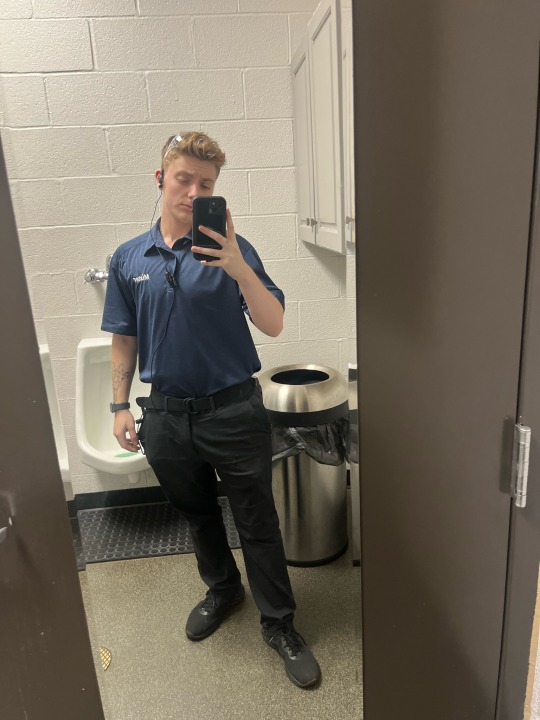




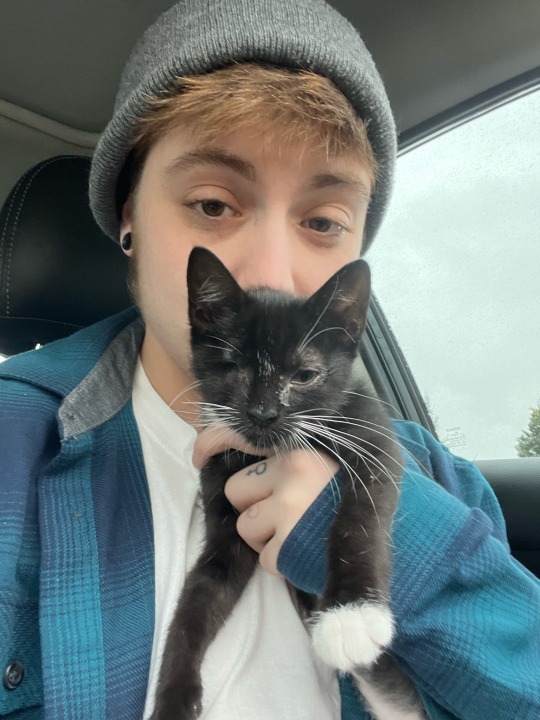

im in love with who i'm becoming
#lgbt#lgbtq#love is love#explorepage#goodmorning#trans male#transgender#ftm transition#trans pride#ftm#ftm pride#trans guy#self care#self love
3 notes
·
View notes
Text

1yr on T 😌
8 notes
·
View notes
Text
Your stability and satisfaction in life is entirely your responsibility. Be careful how you react to events.
623 notes
·
View notes
Text
Reblog this to give the person you reblogged from a heart shaped cookie
96K notes
·
View notes
Text

1 week and 4 days post op 🤩
#lgbtq#ftm transition#trans male#top surgery#love your skin#trans guy#trans man#trans boy#trans rights#trans pride
117 notes
·
View notes
Text
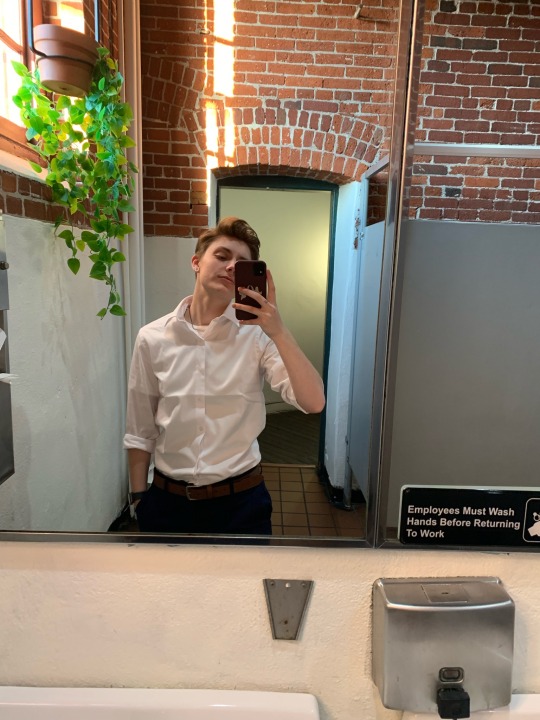
24 notes
·
View notes
Text

10 notes
·
View notes
Text
The Midnight Gospel Analysis 01: What’s real and does it matter?

Going to kick off the revamping of this blog with a deeper look into one of the premises of The Midnight Gospel. A long time ago, I gave some thoughts on the trailer for the show in anticipation of its release. I must say that it did not disappoint and I’ve found myself thinking back on the show quite often since finishing it and rewatching a few episodes here and there.
However tempting it is to get into some of the show’s core messages about spirituality, faith, and generally how to live life, I want to start with an analysis of one premise of the show that’s easy to take for granted. I think that it’s a great way to frame how my analyses will be presented moving forward as well.
I’m talking about the Multiverse Simulator. More specifically, I’ll be discussing the relevance of introducing infinite worlds and their interesting inhabitants, but underscoring that they aren’t real in the literal sense of the word.
Overview of The Midnight Gospel
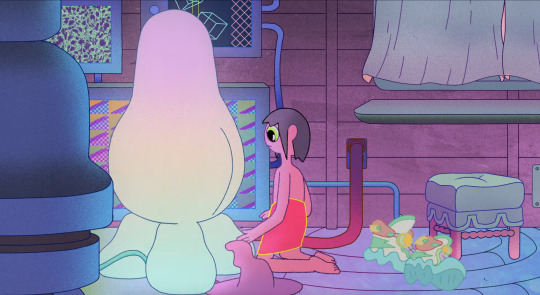
For those unfamiliar with The Midnight Gospel, it’s a show about a space-caster (imagine a video podcast broadcast to all of space) Clancy Gilroy, who interviews different people on life, death, and everything that comes in between. Here’s the catch, though, Clancy’s interviewees are all the product of a simulation. He visits different universes through his Multiverse Simulator, a device that randomly generates worlds and their inhabitants.
Every episode is a different interview, whose content is based on actual interviews by co-creator of the show, Duncan Trussell, for his own podcast. Taking place within the backdrop of a colourful and sometimes absurd world, courtesy of co-creator Pendleton Ward, creator of Adventure Time.
The show goes to some very profound places and at times explores heavy topics. But there are fart jokes at just the right times, and that balance is what makes the show so heartwarming and enjoyable.
With such an episodic premise, The Midnight Gospel may seem very much like a standard interview-type podcast but animated, but this isn’t the case. As the show progresses, we are introduced to more of Clancy’s life outside of his space-casting. His character develops and changes along the way. And that growth can, in large part, be attributed to the conversations he has with the inhabitants of other worlds.
But when circling back to the core of the show, one looming issue emerges. If these interviewees are just the product of some computer algorithms, which, at one point, were programmed by a person, what value do these conversations have? The show does not shy away from reminding us that the Multiverse Simulator is a machine. In fact, the plot of later episodes is driven by technical issues faced by owning a machine that can malfunction. So if none of these interviewees are real, what of their thoughts, words, and actions? Is Clancy, in fact, alone?
Fictional Worlds, Fictional People
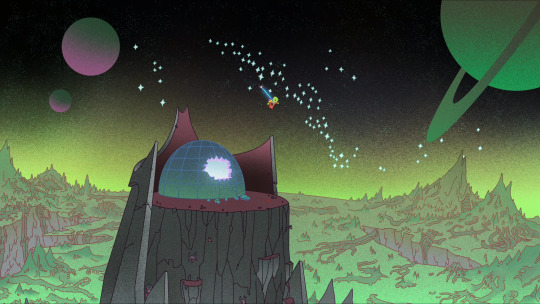
The series does begin with Clancy living alone. Aside from his simulations, his pet dog, Charlotte, and his semi-autonomous home A.I., Computer, Clancy doesn’t interact with anyone else. It’s only towards the end of the series that we see other humans and even then, Clancy carries on a transactional relationship with them, calling on them or interacting with them because he needs something from them.
He also goes out of his way to shut out other people– and without spoiling too much of the upcoming analyses– even those close to him. This behavior stands in contrast to how he interacts with the simulations, where he actively listens to and engages with his interviewees.
On some level, he might just be doing what a good interviewer does to mine for content. However, the conversations he has with them directly affect his feelings, thoughts, and actions, granted some more easily than others. Nonetheless, they change his way of living and his worldview.
If we look at the Multiverse Simulator as an allegory for fiction, then the relationship Clancy has with his interviews makes a lot of sense. Fiction, like the code behind the simulated worlds, is created from human hands. An algorithm that learns how to talk like a human, even experience like a human, must be fed human experiences and realities in the first place.
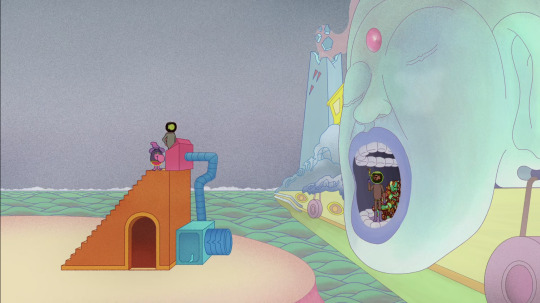
Through fiction, we are exposed to other people’s feelings, thoughts, and experiences, and like any kind of media, we can choose whether or not we want to consume them, engage with them, or internalise them.
However, it might be easier hearing these lived truths coming from a fictional character than from someone we have biases against believing (case in point, how many people dismiss parental truths as paranoia?). In fiction, we’re communicated these truths in a vicarious and visceral way. Show, don’t tell. This makes it all the more impactful.
And what is a Multiverse Simulator but the latest form of cutting-edge entertainment? A new kind of consumable media?
The Multiverse Simulator is an excellent allegory for fiction as well, because sometimes, fiction exaggerates the reality being presented. It blows up and stretches truths in fantastical, terrifying, and sometimes unexpected ways. Nonetheless, we recognise the humanity (or lack thereof) in the characters and in the story.
Furthering the allegory, we see that the multiverses are not separate from one another. There’s a cat ship in one episode that Clancy sets off course and as a result, Clancy is derailed en route to his destination planet in the next episode by colliding with the ship. Similarly, works of fiction inspire each other. Media that creators have consumed influences their work.

And whether or not we create more media, fiction inspires the consumer. At the end of every episode, Clancy edits his space-cast for upload. In this way, all the fiction we consume, whether a book, a show, a movie, or anything else, affects us differently and different points in our lives. The “key takeaway,” “moral of the story,” or whatever you’d like to call it, differs for everyone. We’re editing the most salient point of the media we consume every time we consume them.
But the Multiverse Simulator as an allegory goes even further.
Living in The Matrix

In the everyday grind of lived experienced, it’s all too easy to dismiss the experiences and the very existences of other people. Call them “extras” or “fillers” or “background characters,” we have at one time or another gone through life acting as though only our lived experiences were the capital-R Reality.
Cognitively, we know this is probably not the case. Although philosophers like Descartes, famous for his conclusion cogito ergo sum (I think therefore I exist), have shown that through pure logic, we can doubt the existence of other beings except for us, practically, we live as though our family, friends, and colleagues do exist.
Perhaps the way to put it is that their experiences are not as real as ours. The writer David Foster Wallace puts it really well in “This Is Water.” He says,
“There is no experience you’ve had that you were not at the absolute center of. The world as you experience it is right there in front of you, or behind you, to the left or right of you, on your TV, or your monitor, or whatever. Other people’s thoughts and feelings have to be communicated to you somehow, but your own are so immediate, urgent, real — you get the idea.”
Developmental psychologists also point out that young children believe the world revolves around them, because they still are unable to put themselves in the place of others, and so their own existence becomes the primary reality.
In other words, you have to make an active choice to consider the people around you as real. It’s a mental effort to remember that the people you’re talking to are just as real and living lives just as concrete and tangible as yours. Otherwise, it’s easy to go back to a comfortable place in which your own experience supersedes anyone else’s; therefore, it is your comfort that is the priority and everyone else is just in the way of that.
This thinking hearkens back to the concept of the Matrix. What if everything around were just fabricated and you, specifically you the individual, were the only “real” thing? Or maybe you and a few friends and loved ones were the only real things, what then? There have been many arguments going around about how if nothing matters, then just live in a way that pleases you, other people be damned. Or that only those in your closest circles really matter anyway and only look out for your own.

The Midnight Gospel presents us another option. Whether or not we can be certain everyone around us is going through something the way we are, whether or not we can say discount a negative encounter as the other person just having a bad day, whether or not we want to hear what the world throws at us, we make the choice to listen. We make the choice to take them as real. Just as Clancy does in his interviews.
Because Clancy does encounter people who regularly challenge his worldview. Even if they’re made up. Even if they’re created by a computer. Clancy chooses to open his mind to what the characters are saying and treats them with respect.
And this is not to moralise or to speak of my own morality. This is presenting a way of living as espoused in the show and having it happen to intersect a lot with my worldview.
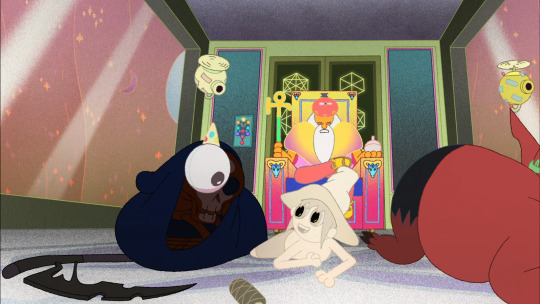
There are times when you definitely feel like just turning off your brain and enjoying some fiction, or just going through life on autopilot because there are too many things to worry about as it is. But for me, analysing and reading into the fiction I consume has always helped me garner a deeper appreciation for the deliberate choices and the story that the creator is trying to tell.
Giving faces to the stories of the faceless “everybody else” I’m all too eager to shut out has greatly improved the quality of my life, and hopefully, the lives of the people around me, because it’s made me just a little more patient, just a little kinder, just a little more understanding. And at the end of the series, Clancy is all those things and just a little more open to what comes next.
_______________________________________________________________________
This is the first of a series of The Midnight Gospel Analyses I have planned. I’ll be linking to the other posts down here, so stay tuned.
147 notes
·
View notes
Text
i wish i knew some trans guys with my deadname so i could dm them this picture

118K notes
·
View notes












